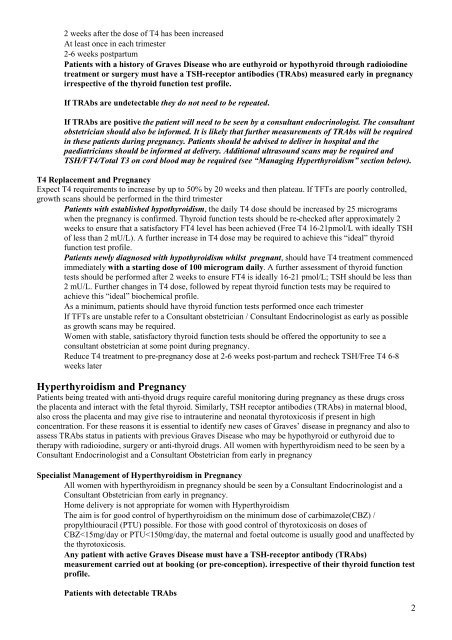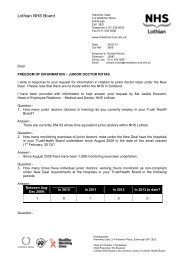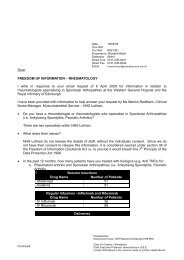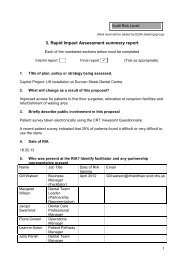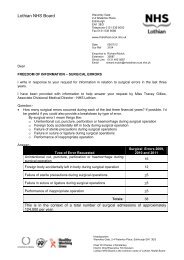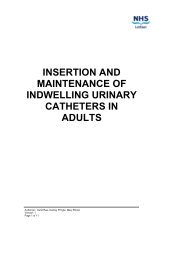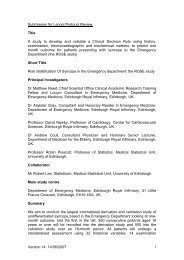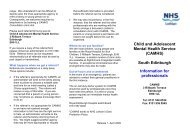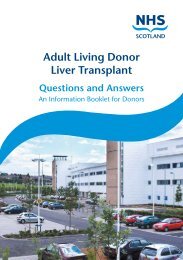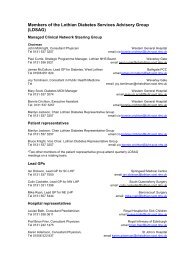Thyroid Function Testing in Primary Care Pregnancy ... - NHS Lothian
Thyroid Function Testing in Primary Care Pregnancy ... - NHS Lothian
Thyroid Function Testing in Primary Care Pregnancy ... - NHS Lothian
Create successful ePaper yourself
Turn your PDF publications into a flip-book with our unique Google optimized e-Paper software.
• 2 weeks after the dose of T4 has been <strong>in</strong>creased<br />
• At least once <strong>in</strong> each trimester<br />
• 2-6 weeks postpartum<br />
• Patients with a history of Graves Disease who are euthyroid or hypothyroid through radioiod<strong>in</strong>e<br />
treatment or surgery must have a TSH-receptor antibodies (TRAbs) measured early <strong>in</strong> pregnancy<br />
irrespective of the thyroid function test profile.<br />
If TRAbs are undetectable they do not need to be repeated.<br />
If TRAbs are positive the patient will need to be seen by a consultant endocr<strong>in</strong>ologist. The consultant<br />
obstetrician should also be <strong>in</strong>formed. It is likely that further measurements of TRAbs will be required<br />
<strong>in</strong> these patients dur<strong>in</strong>g pregnancy. Patients should be advised to deliver <strong>in</strong> hospital and the<br />
paediatricians should be <strong>in</strong>formed at delivery. Additional ultrasound scans may be required and<br />
TSH/FT4/Total T3 on cord blood may be required (see “Manag<strong>in</strong>g Hyperthyroidism” section below).<br />
T4 Replacement and <strong>Pregnancy</strong><br />
Expect T4 requirements to <strong>in</strong>crease by up to 50% by 20 weeks and then plateau. If TFTs are poorly controlled,<br />
growth scans should be performed <strong>in</strong> the third trimester<br />
• Patients with established hypothyroidism, the daily T4 dose should be <strong>in</strong>creased by 25 micrograms<br />
when the pregnancy is confirmed. <strong>Thyroid</strong> function tests should be re-checked after approximately 2<br />
weeks to ensure that a satisfactory FT4 level has been achieved (Free T4 16-21pmol/L with ideally TSH<br />
of less than 2 mU/L). A further <strong>in</strong>crease <strong>in</strong> T4 dose may be required to achieve this “ideal” thyroid<br />
function test profile.<br />
• Patients newly diagnosed with hypothyroidism whilst pregnant, should have T4 treatment commenced<br />
immediately with a start<strong>in</strong>g dose of 100 microgram daily. A further assessment of thyroid function<br />
tests should be performed after 2 weeks to ensure FT4 is ideally 16-21 pmol/L; TSH should be less than<br />
2 mU/L. Further changes <strong>in</strong> T4 dose, followed by repeat thyroid function tests may be required to<br />
achieve this “ideal” biochemical profile.<br />
• As a m<strong>in</strong>imum, patients should have thyroid function tests performed once each trimester<br />
• If TFTs are unstable refer to a Consultant obstetrician / Consultant Endocr<strong>in</strong>ologist as early as possible<br />
as growth scans may be required.<br />
• Women with stable, satisfactory thyroid function tests should be offered the opportunity to see a<br />
consultant obstetrician at some po<strong>in</strong>t dur<strong>in</strong>g pregnancy.<br />
• Reduce T4 treatment to pre-pregnancy dose at 2-6 weeks post-partum and recheck TSH/Free T4 6-8<br />
weeks later<br />
Hyperthyroidism and <strong>Pregnancy</strong><br />
Patients be<strong>in</strong>g treated with anti-thyoid drugs require careful monitor<strong>in</strong>g dur<strong>in</strong>g pregnancy as these drugs cross<br />
the placenta and <strong>in</strong>teract with the fetal thyroid. Similarly, TSH receptor antibodies (TRAbs) <strong>in</strong> maternal blood,<br />
also cross the placenta and may give rise to <strong>in</strong>trauter<strong>in</strong>e and neonatal thyrotoxicosis if present <strong>in</strong> high<br />
concentration. For these reasons it is essential to identify new cases of Graves’ disease <strong>in</strong> pregnancy and also to<br />
assess TRAbs status <strong>in</strong> patients with previous Graves Disease who may be hypothyroid or euthyroid due to<br />
therapy with radioiod<strong>in</strong>e, surgery or anti-thyroid drugs. All women with hyperthyroidism need to be seen by a<br />
Consultant Endocr<strong>in</strong>ologist and a Consultant Obstetrician from early <strong>in</strong> pregnancy<br />
Specialist Management of Hyperthyroidism <strong>in</strong> <strong>Pregnancy</strong><br />
• All women with hyperthyroidism <strong>in</strong> pregnancy should be seen by a Consultant Endocr<strong>in</strong>ologist and a<br />
Consultant Obstetrician from early <strong>in</strong> pregnancy.<br />
• Home delivery is not appropriate for women with Hyperthyroidism<br />
• The aim is for good control of hyperthyroidism on the m<strong>in</strong>imum dose of carbimazole(CBZ) /<br />
propylthiouracil (PTU) possible. For those with good control of thyrotoxicosis on doses of<br />
CBZ


